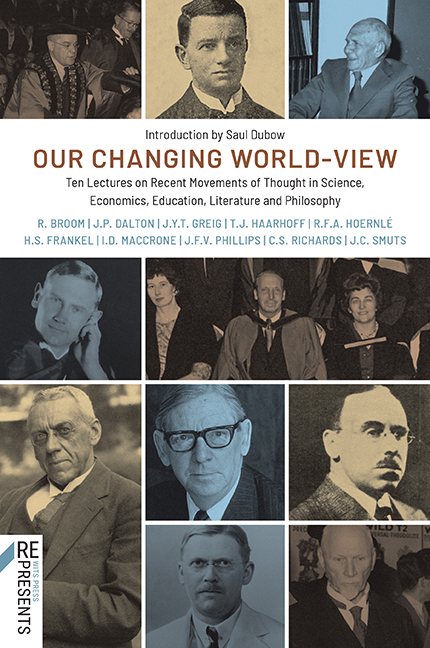 Our Changing World-View
Our Changing World-View Book contents
- Frontmatter
- Contents
- Introduction
- Preface
- Miscellaneous Frontmatter
- 1 Some Recent Scientific Advances in Their Bearing on Philosophy
- 2 The Material World—Yesterday and Today
- 3 Evolution—Design or Accident?
- 4 Man at the Crossroads
- 5 Psychology in Perspective
- 6 Literature in the Machine Age
- 7 The Holistic Attitude in Education
- 8 Our Changing Economic World
- 9 Africa in the Re-Making
- 10 Old Truths and New Discoveries
1 - Some Recent Scientific Advances in Their Bearing on Philosophy
Published online by Cambridge University Press: 12 October 2021
- Frontmatter
- Contents
- Introduction
- Preface
- Miscellaneous Frontmatter
- 1 Some Recent Scientific Advances in Their Bearing on Philosophy
- 2 The Material World—Yesterday and Today
- 3 Evolution—Design or Accident?
- 4 Man at the Crossroads
- 5 Psychology in Perspective
- 6 Literature in the Machine Age
- 7 The Holistic Attitude in Education
- 8 Our Changing Economic World
- 9 Africa in the Re-Making
- 10 Old Truths and New Discoveries
Summary
In this paper I intend to discuss some recent changes in science and their probable effects on philosophy. These changes, so far as physics is concerned, amount to something like a revolution, and their repercussions on philosophy may yet be no less revolutionary. For the relations between science and philosophy have always been very close and intimate. Originally, they were the same thing, Wissenschaft in the broader sense, as the Germans call it. The early Greek philosophers were equally scientists, and Aristotle himself, in whom the movement of Greek thought culminated, was as much scientist as philosopher. We may say that a scientific advance has generally given a great impetus to philosophy. Thus, the coming of modern science in the seventeenth century also meant a philosophic revolution of a farreaching character. The new philosophy began with the new science, and Galileo, Descartes and Newton—to mention only three names—had a profound influence not only in science but also in philosophy. Both the new empirical philosophy of Locke and the rationalist philosophy of Leibniz had their roots deep in the new science; and this is no less true of Kant's great philosophic synthesis. Coming to the nineteenth century, we find an equally strong influence of science on philosophy. This is seen not only in the general mechanistic tone which nineteenth-century science imparted to its philosophy, but also in the far-reaching influence of certain scientific concepts on philosophy. Thus, the new scientific principle of evolution has profoundly affected the whole outlook of philosophy, although philosophy had been acquainted with the vague idea of evolution at least since the time of Aristotle. But it is the recent advances in physics with which I shall be more particularly concerned. These are admittedly of a fundamental character and may therefore eventually have a correspondingly far-reaching effect on our philosophic outlook and ideas. It is admitted that Relativity and Quantum theory have between them made a greater change in physics than any other discoveries since the seventeent century. They involve new viewpoints and a new technique which make it possible to re-survey accepted ideas and principles and to subject them to a far more searching scrutiny than was ever possible before.
- Type
- Chapter
- Information
- Our Changing World-ViewTen Lectures on Recent Movements of Thought in Science, Economics, Education, Literature and Philosophy, pp. 1 - 20Publisher: Wits University PressPrint publication year: 2021


